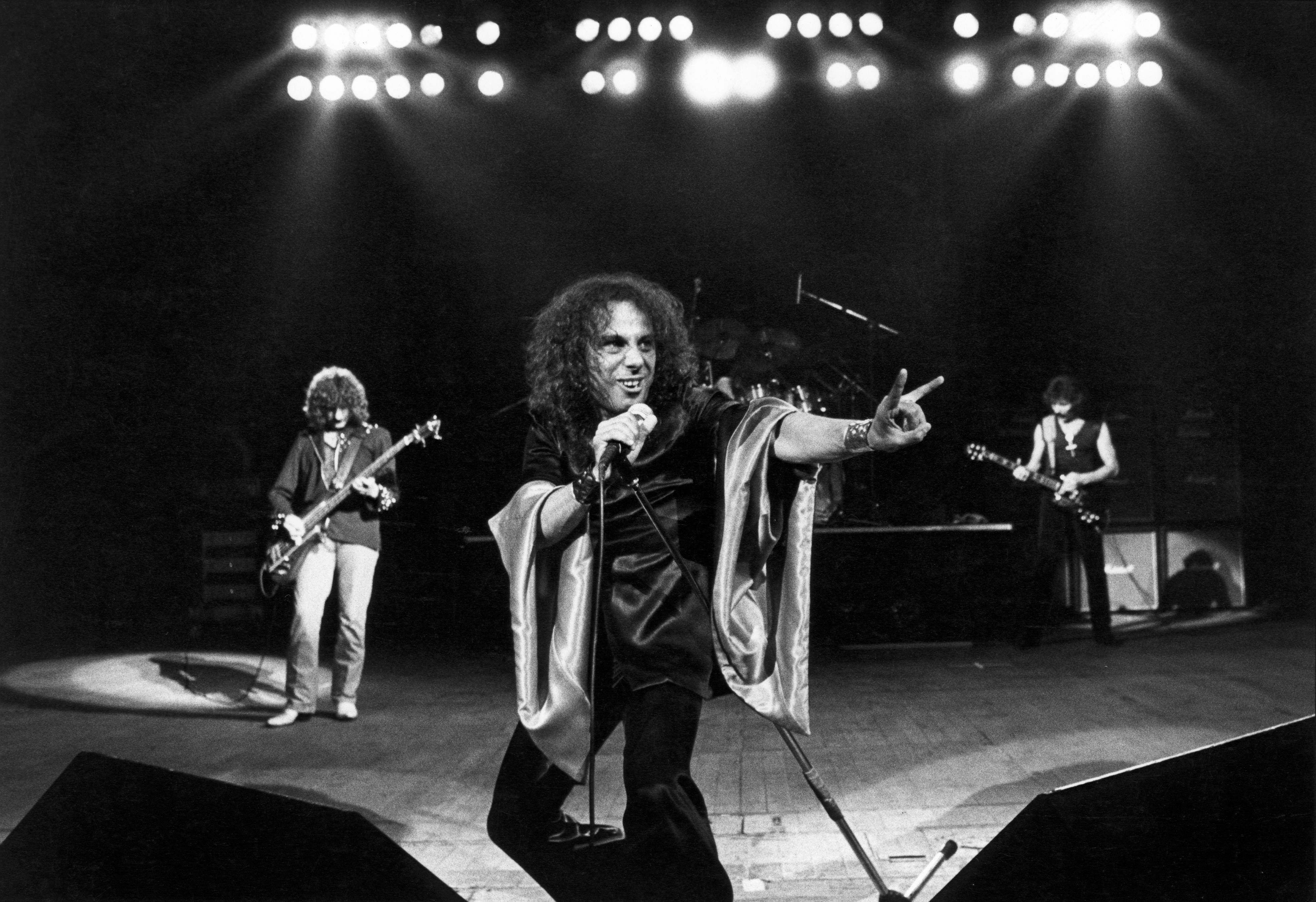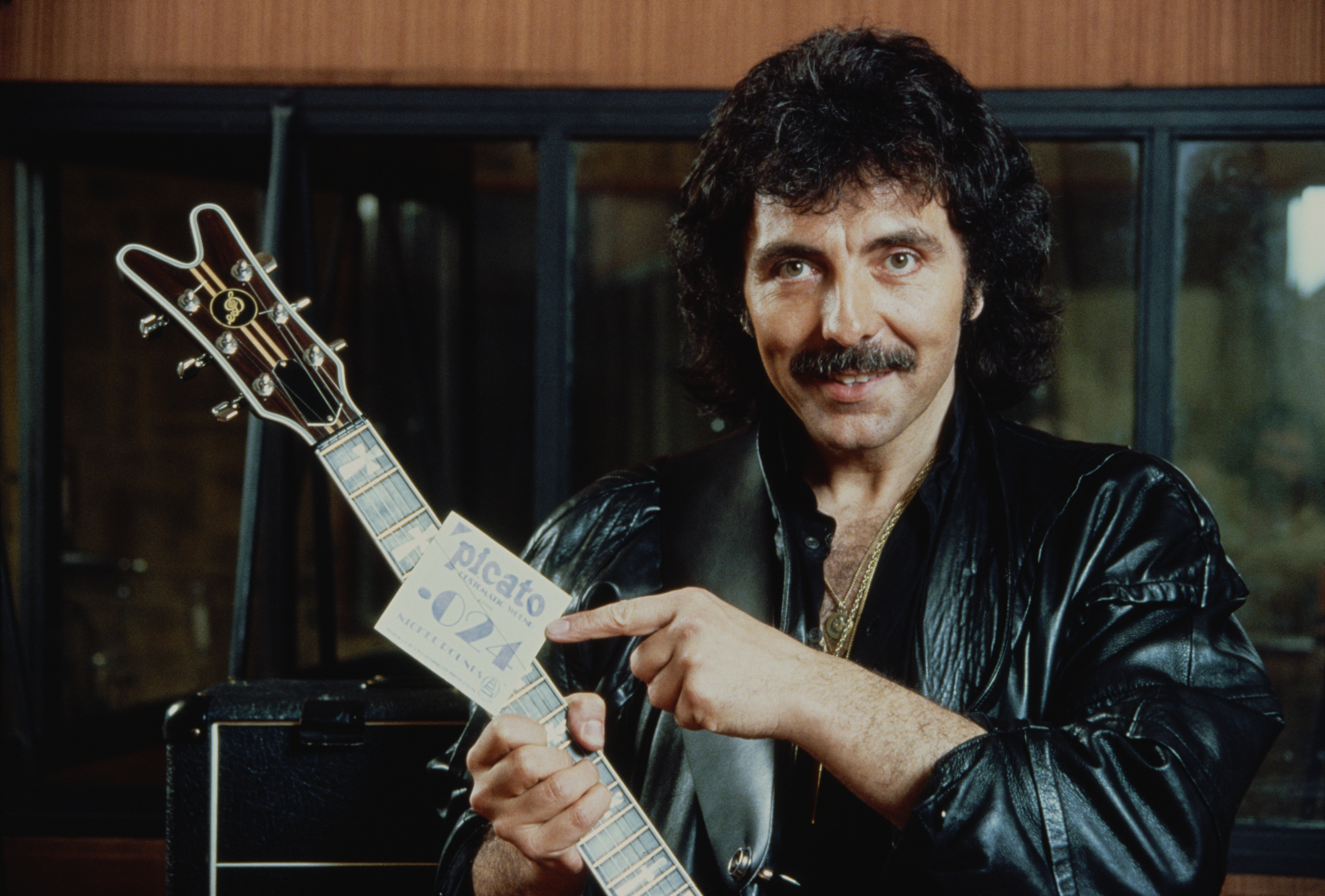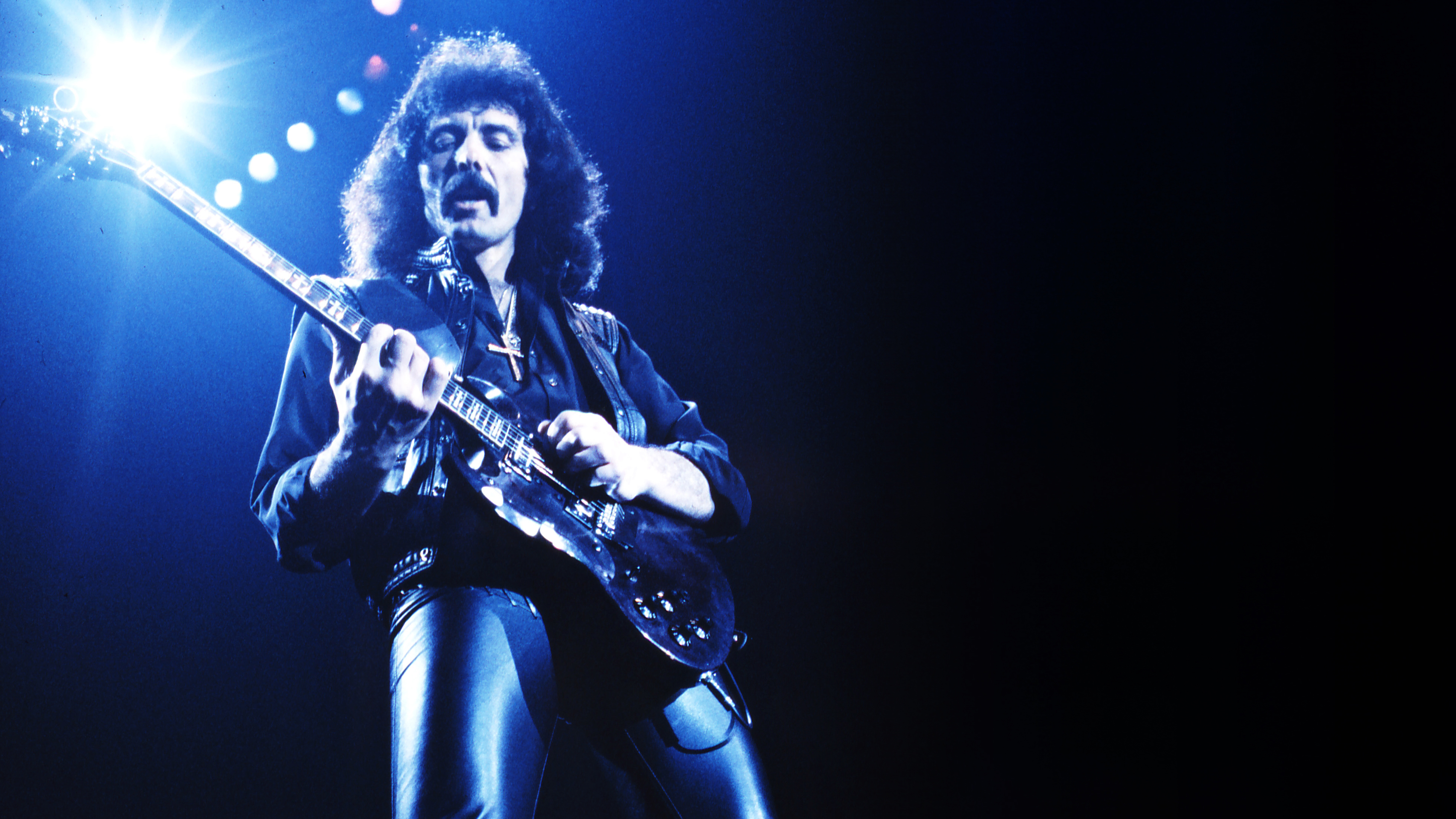To read the full list of our 100 greatest guitar solos of all time, click here.
10) Paranoid
TONY IOMMI
From: Black Sabbath – Paranoid, 1970
We can’t not choose it. It’s too big, too classic and too… well, good to ignore. Tony Iommi’s distorted, head-swirling yet fiercely hooky technique – combining mystique and heavy-hitting power – has influenced scores of guitarists across metal, stoner, hard rock and other genres and sub-genres. Indeed it feels relatively rare for a present-day rock or metal band to not mention Black Sabbath as an inspiration, largely thanks to Iommi’s involvement. And when it comes to his solos, the one in Paranoid is the most iconic, the most singular in its drive.
If this were a feature on the greatest riffs, it would be virtually impossible to pick one Iommi winner, such is his all-round prowess and pioneering playing style. But more so than any of his other solos, the one in Paranoid sticks out for everyone, not just rock fans – with its fearsome blend of blues scaling, exotic-sounding touches and tasty notes played on bends (probably using Iommi’s then-favoured Gibson SG and Laney amp pairing). It’s clever and colourful without sounding overworked, delivered with grit and energy that somehow makes him sound louche and furious at the same time.
A predictable choice for this list? Maybe, but it couldn’t be more justified. A stone-cold classic.
Q&A with Tony Iommi
When he wasn’t setting bandmate Bill Ward on fire, Black Sabbath guitarist Tony Iommi kept himself busy inventing then defining the sound of metal lead guitar. Fuelled by the influence of blues-rock greats such as Eric Clapton, Jimi Hendrix and Jeff Beck, Iommi used one of the most unique set-ups in rock to create a sound that was way heavier than anything that had come before. Here he geeks out on gear, heroes and how a brown-eyed handsome man taught him how to solo.
Can you remember what got you hooked on playing lead guitar?
Chuck Berry was the first thing I really liked. In my generation you tended to grasp onto anything someone was playing a solo in. You’d think: “I can learn to play it.” Everybody liked Johnny B. Goode. It was the same type of solo he played in a lot of his songs, but that was the link then. I mean, we all played it, from me, the Stones, probably even Clapton.
Which was the first guitar solo you learned to play?
It probably would have been a Chuck Berry solo. I can’t actually remember. It’s a bloody long time ago!
Which of your solos do you most enjoy playing live?
At the moment I’m really enjoying doing Dirty Women [from Technical Ecstasy, 1976] one of the lesser-known tracks. I get a chance to jam in that one. In most of the other songs it’s very regimented because the solos are part of the song; on War Pigs and all those, people can sing the solo. So Dirty Women is a jam and it lasts as long as I want to play. Once I move away from my monitors the band know we’re moving onto another bit.
You came up during the British blues era when everyone was jamming a lot.
It was great. You could go out and, well, I know I could play solos for twenty minutes, be jamming along. It was a great experience being able to try different things. You get excited and think: “I’m going to try this tonight.” And if it worked it worked, if it didn’t, try something else. You could practise and enjoy it at the same time. Now, people’s attention span is a minute. If you start jamming they go to the toilet.
Who influenced you as a lead guitarist?
My sort of style of guitar players are more from the blues. I liked Clapton. I liked his style of playing from the Bluesbreakers. I think that inspired a lot of people in them days. Then of course there’s Jimi Hendrix, Jeff Beck… you know, the players more from around my generation.
What did you make of the shredders who followed in your wake, guys like Eddie Van Halen?
We had Van Halen tour with us for eight or nine months. Eddie’s one of my closest friends. But when I first heard him I thought: “Bloody hell!” I mean, he was playing such a different thing to anything I’d heard. It was like a totally different style. I was very impressed at what he did.
Did any of that stuff rub off on you?
As far as playing more technical stuff for me, that was probably round when we done Heaven And Hell [1980], Neon Knights or something like that. I was a bit more adventurous on that album. It was a slightly different style for me because we had a slightly different sound when [Ronnie] Dio came in. Obviously there was a big change with his voice, and he encouraged me to play more solo stuff. There was probably more guitar stuff on that album than I’d done for a long time. Lonely Is The Word is another one I enjoyed on that album, cos it’s a slow song and I played a bluesy, jazzy solo. But again, if I heard it now I’d probably think it was crap. Of course, now we’re back with Ozzy we don’t do any of the stuff we did with Dio or Tony Martin or [Ian] Gillan, it’s all Ozzy.
Did you listen back to the early Sabbath records when Ozzy came back?
Absolutely. I wanted try and create that feel again. It went as far as having my amps rebuilt to the same as they were in the early days.
You didn’t use Marshall, Hiwatt or Orange amps like everyone else.
I did use Marshalls in the early days, before Sabbath. Then when we started I still had the Marshalls, but then got involved with Laney. They were from Birmingham, and at the time they offered us all the equipment, which in them days we couldn’t afford. They gave us the backline and the PA, all that stuff.
What made you to go back to Laney?
When we done the last album [13, 2013], [producer] Rick Rubin said to me: “Have you got your original amps?” I said: “Rick. We’re talking fucking forty-five years ago! How am I going to have my original amps?” It was hard to get the very early Laneys that I used to use. So I went to Rick’s studio [Shangri La] in California, and there’s like ten amps set up. He’s got Klipp amps from Laney, which I never used anyway, then there was Marshalls. I said to Rick’s engineer: “What’s all this?” He went: “Rick wanted me to get you some vintage amplifiers.”

- Tony Iommi on inventing heavy metal, drinking with Gillan, and not being evil
- Every Song On Black Sabbath's Paranoid Ranked From Worst To Best
- The Top 10 Worst Black Sabbath Songs Ever
- Black Sabbath’s Tony Iommi misses playing pranks on Bill Ward
But you still went with Laney?
Well I tried the amps Rick had got and they were crap. I couldn’t find one that sounded right for me. Somebody else might like them but I certainly weren’t impressed. It’s like because they’re ‘vintage’ people think they’re gonna be great. I mean, everybody who I knew from the past, Pete Townshend onwards, had work done on their amps. You had modifications done on them to give you more boost and whatever else. So that why I got back into Laney.
Laney actually tracked down an original amp head for reference.
They could only locate one amplifier; they found some 60-watts but they could only locate one 100-watt, which we got. They built ten for me, and now we produce it [as the Tony Iommi Signature TI100 head], obviously with better components. And that’s what I use now.
You were a Fender Stratocaster guy when you started recording Black Sabbath, then you switched to the Gibson SG. Why was that?
My Strat broke, so I had no option. I had a second guitar, which I had never used, which was the Gibson. I’d only recently got it, and it was left-handed.
You were lucky to find a left-handed SG in those days.
I’d actually bought a right-handed one, and played it upside down, just as a spare guitar. I got it really cheap. Then a guy contacted me and said he’d got a left-handed one and did I want to swap. So basically that’s what we did. I swapped the guitar with him and that was that.
What happened to your Strat?
In the studio, I was recording on the Strat – Wicked World, I think it was – and then my pickup went. I thought, oh shit, of all the times! The first album. I didn’t have the time to take it into a shop and get anything done, cos we only had one day to do the album. So I had to use the Gibson – oh blimey… But once I did it on there, that was it, that became my guitar then. I never used the Strat again!
It’s almost like fate. You and the Gibson SG were meant to be.
It is. It’s really peculiar. I’d used that Strat for years. I worked on it for a long time myself because there weren’t people doing that kind of thing back then. So I got the Strat just feeling right for me. Then the first album… it’d gone! I couldn’t believe it. It’s Sod’s law.
Why did you fall for the SG so hard?
I could get up to the higher frets. If I used a Les Paul or anything like that I could never do that. The SG was light and you could reach the top frets. I liked that. I never wandered from the SG, for a long time.
You eventually ‘wandered’ over to [British guitar luthier] John Birch.
I put some money into his company. What happened was, I wanted a twenty-four-fret guitar. I contacted a couple of companies and they said no, that’s impossible. You can’t do that. John Birch was a bit of a loon and he tried it. He was willing to have a go. He was a bit of an experimenter. I said: “If I get involved in the company will you make me a twenty-four-fret guitar?”
What happened next?
He made me a twenty-four-fret guitar! I tried it, and that was it… I used that then.
A two-octave twenty-four-fret neck has now become the standard for rock and metal guitarists.
Later on, companies started copying and doing them. In them days I never registered ideas. I didn’t think of that. I just wanted a twenty-four-fret guitar. I didn’t think about producing them or anything like that. Now everybody’s got a bloody twenty-four-fret guitar.
You’ve always had a distinctive sound, especially in the early days.
I used to use a [Dallas Arbiter] Rangemaster in those days [the Rangemaster is a treble booster used to push amps into overdrive before the advent of master volumes and gain controls]. It was a bog-standard Rangemaster, but this guy I met in the sixties said he could make it sound better. He said: “Let me take it tonight and I’ll bring it back tomorrow.” I knew this guy… well, I’d seen him around, he was local. He was the guitar player from before Spooky Tooth, when they were called Art.
Anyway, so he took it away and brought it back, and I really liked it. And I used it up until I think the Heaven And Hell album, when we’d had a guy come in and rebuild some Marshalls for me…. I used Marshalls then. He bloody rebuilt all these amps. They were all new… I’d got six amps and he rebuilt them, made them more powerful. But he threw my bloody treble booster away. I couldn’t believe it. After all those years.

How did you take the news?
I nearly had a fit! I said: “Where’s my treble booster?” He said: “Oh, that. I threw it away the other week.” I couldn’t believe it. I mean, that was, like, iconic, you know? So that was it. He threw it in the bloody skip. It’s in a landfill somewhere by now. I did actually read that someone had it, but that’s bullshit. I should think if they’ve got it it’s probably quite flat by now.
You famously use very light-guage strings because many years ago you lost your fingertips in an industrial accident and use plastic tips on some of your fingers.
Yes, I really had to start again and come up with a totally different way of playing. That was a challenge.
Along with changing to the Gibson SG, do you think the way you dealt with your accident – light-guage strings, using prosthetic fingertips – contributed to your unique sound?
I think so. It made me more aware of my limitations. Things that I could do before the accident and couldn’t do after, I tried to make up for it and make my sound bigger. So I worked on that and tried to get the guitar right: the right action, the right feel, and the right sound with the amp.
You mentioned that the last Sabbath album, 13, was a slight return to the way you recorded the first album. Did that extend to your lead work?
I would say to Rick: “I’m just going to play a rough solo for now.” And he said: “Yeah, do that. We can always replace it.” Of course, what happens? We didn’t replace it. So it became the solo. Much like the early days where the first solo I played went on the album.
Which do think is the greatest guitar solo of all time?
That’s a never-ending question. There are so many great solos. I’ll tell you a good one: 25 Or 6 To 4 by Chicago. He [Terry Kath] did a good solo in that. I like Jimi on All Along The Watchtower. That was a great solo. Then there’s Clapton stuff like Spoonful…
Who do you think will top our Greatest Solos list?
Well it won’t be me!
Black Sabbath Albums Ranked From Worst to Best
The 10 best Black Sabbath songs from their final tour, by Adam Wakeman
